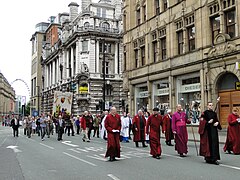Whit Sunday
| Whitsun | |
|---|---|

Manchester 2010 Whit Walks
|
|
| Date | Seventh Sunday after Easter |
| 2016 date | 15 May |
| 2017 date | 4 June |
| 2018 date | 20 May |
| 2019 date | 9 June |
| Frequency | annual |
Whitsun (also Whitsunday, Whit Sunday or Whit) is the name used in Britain and Ireland, and among Anglicans throughout the world, for the Christian festival of Pentecost, the seventh Sunday after Easter, which commemorates the descent of the Holy Spirit upon Christ's disciples (Acts of the Apostles chapter 2). In England it took on some characteristics of Beltane, which originated from the pagan celebration of Summer's Day, the beginning of the summer half-year, in Europe.Whitsuntide, the week following Whitsunday, was one of three vacation weeks for the medieval villein; on most manors he was free from service on the lord's demesne this week, which marked a pause in the agricultural year.Whit Monday, the day after Whitsun, remained a holiday in the UK until 1978 when the movable holiday was replaced with the fixed Spring Bank Holiday in late May. Whit was the occasion for varied forms of celebration. In the North West of England, church and chapel parades called Whit Walks still take place at this time (sometimes on Whit Friday, the Friday after Whitsun). Typically, the parades include brass bands and choirs; girls attending are dressed in white. Traditionally, Whit fairs (sometimes called Whitsun ales) took place. Other customs such as Morris dancing were associated with Whitsun, although in most cases they have been transferred to the Spring bank holiday. Whaddon, Cambridgeshire has its own Whitsun tradition of singing a unique song around the village before and on Whit Sunday itself.
The name is a contraction of "White Sunday", attested in "the Holy Ghost, whom thou didst send on Whit-sunday" in the Old English homilies, and parallel to the mention of hwitmonedei in the early 13th-century Ancrene Riwle.Walter William Skeat noted that the Anglo-Saxon word also appears in Icelandic hvitasunnu-dagr, but that in English the feast was always called Pentecoste until after the Norman Conquest, when white (hwitte) began to be confused with wit or understanding. According to one interpretation, the name derives from the white garments worn by catechumens, those expecting to be baptised on that Sunday. Moreover, in England white vestments, rather than the more usual red, were traditional for the day and its octave. A different tradition is that of the young women of the parish all coming to church or chapel in new white dresses on that day. However, Augustinian canon John Mirk (c. 1382–1414), of Lilleshall Abbey, Shropshire, had another interpretation:
...
Wikipedia
